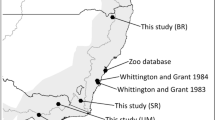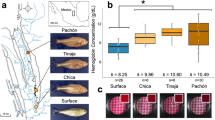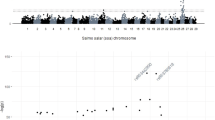Abstract
ERYTHROCYTE organic phosphate concentration is known to be an heritable trait in both humans and rats1–3. In humans this trait has been correlated with genetic variability of both pyruvate kinase and hexokinase2. However, similar phenomena have not been reported in lower vertebrates. During our studies on the allosteric regulation of fish haemoglobins by ATP (ref. 4) we observed significant variability in red cell ATP concentrations among individuals of the killifish Fundulus heteroclitus, and wondered whether this variability in organic phosphate could be the result of a genetic component. Consequently, we analysed F. heteroclitus for red cell ATP, concomitantly screening for enzyme variants. We report here that not only are ATP levels under genetic control, but they are also highly correlated with lactate dehydrogenase (LDH) phenotype. To our knowledge, this is the first such correlation reported. Moreover, as ATP is the major allosteric modifier of F. heteroclitus haemoglobin–oxygen affinity5,6, this study provides a basis for an association between LDH and the fish's external environment through the physiological role of haemoglobin at the organism–environment interface.
This is a preview of subscription content, access via your institution
Access options
Subscribe to this journal
Receive 51 print issues and online access
$199.00 per year
only $3.90 per issue
Buy this article
- Purchase on Springer Link
- Instant access to full article PDF
Prices may be subject to local taxes which are calculated during checkout
Similar content being viewed by others
References
Brewer, G. J. Biochem. Genet. 1, 25–31 (1967).
Brewer, G. J., Oelshlegel, F. J. & Eaton, J. W. Ann. N. Y. Acad. Sci. 241, 514–523 (1974).
Noble, N. A., Brewer, G. J. & Oelshlegel, F. J. Biochem. Genet. 16, 39–44 (1978).
Greaney, G. S. & Powers, D. A. Nature 270, 73–74 (1977).
Mied, P. & Powers, D. A. J. biol. Chem. 253, 3521–3528 (1978).
Powers, D. A., Greaney, G. S. & Granet, M. A. Fedn Proc. 33, 1302 (1974).
Whitt, G. S. Science 166, 1156–1157 (1967).
Place, A. R. & Powers, D. A. Biochem. Genet. 16, 577–591 (1978).
Powers, D. A. & Powers, D. in Isozymes, Vol. 4, 63–84 (Academic, New York, 1975).
Powers, D. A. & Place, A. R. Biochem. Genet. 16, 593–607 (1978).
Chappelle, E. W. & Picciolo, G. L. in Laboratory Procedures Manual for the Firefly Luciferase Assay for ATP (Goddard Space Flight Center, Maryland, 1975).
Author information
Authors and Affiliations
Rights and permissions
About this article
Cite this article
POWERS, D., GREANEY, G. & PLACE, A. Physiological correlation between lactate dehydrogenase genotype and haemoglobin function in killifish. Nature 277, 240–241 (1979). https://doi.org/10.1038/277240a0
Received:
Accepted:
Issue Date:
DOI: https://doi.org/10.1038/277240a0
This article is cited by
-
Enzyme heterozygosity, metabolism, and developmental stability
Genetica (1993)
-
Differential fitness of allelic isozymes in the marine gastropodsLittorina punctata andLittorina neritoides, exposed to the environmental stress of the combined effects of cadmium and mercury pollution
Environmental Management (1987)
-
Properties of allelic variants of phosphoglucomutase from the sea anemone Metridium senile
Biochemical Genetics (1985)
-
Effect of an allozyme polymorphism on regulation of cell volume
Nature (1982)
-
LDH-B genotype-specific hatching times of Fundulus heteroclitus embryos
Nature (1982)
Comments
By submitting a comment you agree to abide by our Terms and Community Guidelines. If you find something abusive or that does not comply with our terms or guidelines please flag it as inappropriate.



